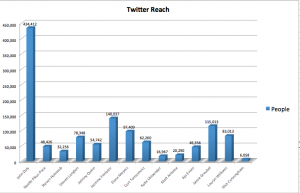 Finding and securing government speakers can be a challenge. The approval process for government speakers takes time and is more complex than for the private sector. Competing events are also vying for your subject matter expert’s time. The following 10 topics and related questions create effective tips to help you prepare for your next public sector event.
Finding and securing government speakers can be a challenge. The approval process for government speakers takes time and is more complex than for the private sector. Competing events are also vying for your subject matter expert’s time. The following 10 topics and related questions create effective tips to help you prepare for your next public sector event.
Strategy
Are you interested in defense or civilian agencies, or both? Do you have a good sense of the level of speaker you are interested in securing for keynotes and various sessions – administrator, CXO, deputy director, etc.? Will speaker invites go through public affairs offices or will you also approach some speakers directly? Will your primary mode of communication be email, web forms, phoning or a combination? Is social media part of your speaker acquisition plan (yes, we’ve tweeted speaker invites before)? Will alternative speakers be acceptable? You need a speaker acquisition strategy for your event that takes all of these elements into consideration.
Research
Have you created a target list of speakers based on set criteria (i.e., agency, topic, level or title)? Is your target list large enough? Have you captured current contact information for everyone on your list? Do you have a nice mix of agencies or are some agencies on your list overly represented – or not represented at all? Are you certain that your speaker list reflects agencies currently involved in the subject matter to be discussed at your event? Make sure your research efforts reflect all of these details.
Timing
Have you created the timelines needed to secure your public sector subject matter experts? Have you built in enough time to secure any agency approvals necessary to proceed? Will your team have ample time for attendee marketing and event promotion once speakers are secured? Do you have a production schedule that includes deliverables and corresponding dates? Keep an eye on your calendar to stay ahead of the curve on these aspects.
Value
Do you have a compelling value proposition that motivates the speaker to participate in your event – have you communicated why they would want to be involved in terms of attendees, subject matter and fellow speakers? Have you articulated the differences between your event and others in the same space? Can you align your event’s timing and subject matter with agency communication and branding efforts? Make sure your prospective speakers understand the value to them, as well as their value to your event and attendees.
Communications
Inbox and voicemail clutter seem to be at an all-time high. Is your subject line clear and concise? Is your communication personalized (beyond the salutation)? Do you offer relevant information up front? Have you included necessary logistical details? Have you clicked on live links in your invite to make sure they work? Have you included sponsor information, if applicable? Have you double-checked formatting, grammar and spelling? Does your note look nice? Have you created a thank you note to be used in post-event communications? Clear communications are essential to successful speaker acquisition.
Relationships
Have you mapped out agency relationships necessary to secure your speaker (public affairs, communications, executive assistant, general counsel, ethics, consultants, schedulers, others)? Are you connected to your contacts on LinkedIn? Do you participate in government communities to bolster these relationships? The stronger your relationships, the more likely your target speakers are to accept your invitation to present.
Due diligence
Have you looked at current projects speakers are involved with, as well as their recent mentions in the press and appearances? Have you checked competing events on the landscape? Have potential speakers been vetted through LinkedIn or other means to make certain they are still with the government? Have you noted any past events they participated in for you? Are you aware of external factors that may affect a speaker’s interest or availability to participate in your event? Have you gathered the cost of incidentals, such as meals and parking, to comply with government guidelines? Undertaking due diligence will help ensure a successful interaction before your invitation and communications are even delivered.
Process
Do you have a well-documented process and infrastructure in place to track speaker response? Does your system include easy-to-find and well-organized information that allows for timely follow-ups? Do you have a mechanism in place to update the event website, in real time, as speakers come on board? Are you using a collaborative platform that shares information and invites input from the rest of your team? As your speaker database grows, so will the accompanying information. It is imperative to be able to identify email threads, phone conversations and other communications quickly. After all, time is money, and a strong process will save time and lead to successful choices.
Logistics
Has your team communicated event logistics to speakers and their staffs? Have speaker presentations been collected? Have you sent event invites to all speakers? If possible, have you noted day-of phone numbers for speakers in case of emergencies? Have you communicated any speaker and staff concerns to the onsite staff? Do you have permission to distribute speaker presentations to attendees? Is your final agenda set? These logistical details can ensure a smooth-running event and head off common glitches.
Contingency planning
Do you have a contingency plan in case one of your speakers has to bow out at the 11th hour – a short list of speakers who have expressed an interest or can be called on in a pinch? Do you have speaker request forms at the ready in case they are needed, and to expedite the approval process? Try to imagine a worst-case scenario so you can have a contingency plan in place and don’t have to panic in the face of a sudden change in a speaker’s availability.




